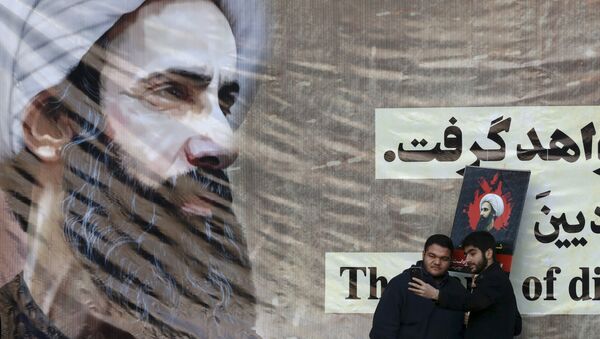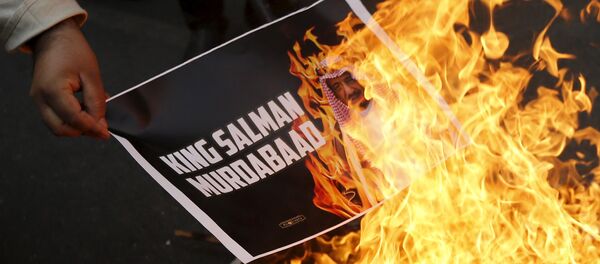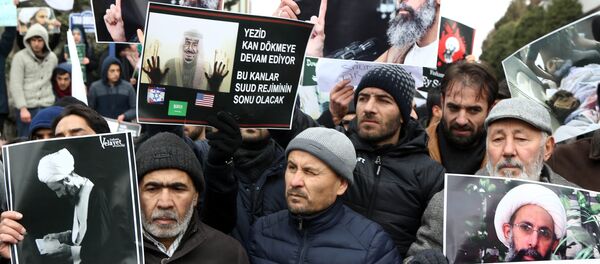In his analysis for Le Huffington Post, Chaudet, the editing Director of the Paris-based Center for the Analysis of Foreign Affairs, started by praising "the position of French journalists who reported on the fearfulness or even 'diplomatic impotence' of France: Paris could and should have done much more against the background of the growing threat of conflict between Iran and Saudi Arabia."
French-Saudi relations, the analyst notes, "had they been cleverly constructed, would have allowed the Foreign Ministry to have the ear of some Saudi policy makers, and thus help to ease the crisis. But in order to influence, one must also understand."
"But what could have become a demonstration of convergence between the Iranians and the Saudis turned into a violent demonstration of their differences, due to the death of one man: Shiite cleric Nimr al-Nimr. Who was this man, whose death entailed a surge in tensions between two key Middle Eastern powers?"
Saudi Shiites – a Minority Long Forgotten by the West
Noting that he would not be writing yet another biography of the Shiite activist, the analyst explained that ultimately, what's most important to understand here "is that he was a prominent spokesman of a minority long forgotten by the West: Saudi Shiites, who make up 10-15% of the Kingdom's population."
This group, Chaudet recalled, lives for the most part in Ash Sharqiyah, or Saudi Arabia's Eastern Province, "which borders Bahrain and has a long, common history with it." This history, he notes, "has allowed them to form a very specific identity in relation to the rest of the country, and has become a source of pride, and even a desire for independence for some."
"However," Chaudet explains, "it was with the creation of Saudi Arabia when things took a more severe turn: the country was formed on the basis of an alliance between the House of Saud and the Wahhabi. And although some part of the elite in Riyadh takes a pragmatic view of things, the followers of the Wahhabi ideology believe that the existence of Shia on their territory, and in the Muslim world in general, is a perversion which must be eradicated."
"In a 2011 sermon [available here with English subs], al-Nimr expressed as much, when he said that the security chief of Ash Sharqiyah openly told him that all Shiites must be destroyed." The cleric's speech, the analyst notes, "perfectly reflects Saudi Shiites' commitment to the cause of their Bahraini counterparts, their political struggle more broadly, and their rejection of the accusations of being subservient to Iran."
"In fact, a study of open sources completely refutes the theory of Iran's manipulation of Saudi Shiites often suggested by Riyadh. Of course, Tehran cannot but be interested in the fate of Shiites in the Arab world and elsewhere, given that in historical and political terms, Iran is the Shia Twelver equivalent of the Vatican. In the 1980s, some Shia activists looked upon the Iranian revolution of Ayatollah Khomeini as an example. Still, alignment with Khomeini in the 1980s, as with [the pan-Arabist ideas of Egypt's] Gamal Abdel Nasser in the 1950s, was for Saudi Shiites an expression of protest against injustice more than anything else."
"Today, Iran supports Lebanon's Hezbollah, Shiite forces in Iraq, and Syria, for obvious geopolitical reasons. Investing in other Shiite communities for political reasons would be counterproductive. In the past, Hezbollah existed in Saudi Arabia, too, but was dismantled in the 1990s."
Moreover, "Iranian religious authorities have called for the easing of tensions between Shiites and Sunnis in Saudi Arabia, which cannot but reflect the views of the country's top political authorities. An excellent example of this last point was the official address of Ayatollah Nasir Makrim al-Shizari in 2007, where he urged Saudi Shiites not to start a conflict with the Sunni majority and not to provoke them, despite the denial of their religious rights."
Politics, Not Religion, the Heart of the Conflict
Ultimately, Chaudet explains, "the Saudi Shiites would hardly listen to the world of the Iranian Ayatollah anyway, because the problem is not so much a religious one as it is political. Sure, al-Nimr expressed sympathy for Iran from time to time, particularly when he clashed with Washington over Tehran's alleged nuclear program, and with the Israelis over the Palestinians and Hezbollah. However, these statements were based on his political position. Moreover, he denied any suggestions that he was 'pro-Iranian', stressing that to him, what mattered was ending discrimination against Shiites, a more equitable distribution of economic resources and the development of the east, and the release of political prisoners."
"The only Iranian influence on al-Nimr," the expert notes, "was the Khomeini inspired concept of radical opposition to the 'Taghut', or tyrannical rule, which is a concept with more political than religious connotations."
"The heart of the matter," according to the analyst, "is not the opposition between Shiites and Sunnis. It is about a rebellion of the Shiite youth of Ash Sharqiyah who face discrimination in their communities. Their religious freedom is severely limited by the Saudi Wahhabi approach; they are openly discriminated against on an economic level; one will not find any Shiites in any important positions in the country's ministries, companies, or even the local branch offices of foreign companies."
"Beyond their demands for their own communities, Shiite activists openly call for turning Saudi Arabia into a federalized constitutional monarchy, providing the provinces with greater autonomy. This was the essence of the demands of the moderate Shiite reformers, who in 2011 were caught up by a wave of enthusiasm following the revolutions in Tunisia and Egypt. They had also called for the release of political prisoners, a program supported by Sunni Saudi reformers as well."
"In the short term, the campaign succeeded, but it would have disastrous consequences in the long term, widening the sectarian divide and strengthening the separatist tendency among some Shiites. For his part, al-Nimr followed the trend toward the radicalization of a minority caught in a political impasse, becoming the voice of the radicalized youth, who saw him as one of their own (he was arrested eight times for supporting and participating in demonstrations)."
Nimr a Malcom X-like Activist, But Not a Terrorist…
However, "even at the height of his radicalization, when he openly called for the overthrow of the monarchy (February 10, 2012), al-Nimr never asked for Iran's help, and never called for sectarian terrorism. So he was neither a terrorist nor a foreign agent, but more so an activist, even if he was closer to a Malcom X-like figure than a Martin Luther King."






